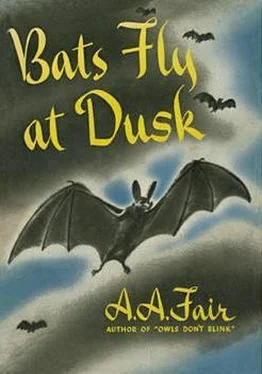It was beginning to get dark. Bertha switched on the headlights and drove slowly. Reaching Riverside, she went into one of the older hotels, registered as Mrs. L. M. Cushing and daughter, secured two rooms with a connecting bath, and made some ceremony of getting Kosling up to the rooms and safely ensconced.
“Now,” Bertha announced, “you’re going to stay right here, and we’re going to talk.”
At the end of an hour when Kosling felt he was completely talked out, Bertha ordered some dinner sent up from a nearby restaurant. An hour later she went to a public telephone, called the hotel in San Bernardino, and said, “This is Mrs. Cool. The thing that I was afraid was going to happen has happened. My mother’s had another stroke. I won’t be able to get back to pick up my things. Please store my suitcase. You’ll find that my bill is paid, and there are no telephone calls or other extras.”
The clerk assured her that he regretted the nature of the occasion which prevented Bertha Cool from returning, that he trusted her mother would make a complete and prompt recovery, and assured Bertha she had nothing whatever to worry about in connection with her belongings.
Bertha thanked him, returned to the hotel, and for two more hours pumped the blind man, trying to get some bit of information out of him, going over the events of the last week with monotonous repetition, a probing search for detail.
Kosling at length became tired and irritated. “I’ve given you everything I have to give; told you all that I know,” he said petulantly. “I’m going to sleep. I wish I’d never seen you and never interested myself in that girl at all. As a matter of fact she—” His voice faltered as he choked off what he was going to say.
“What’s that?” Bertha asked pouncing on his unfinished sentence.
“Nothing.”
“What were you going to say?”
“Oh, nothing, except that — I’ve been disappointed in that girl.”
“What girl?”
“Josephine Dell.”
“Why?”
“Well, for one thing, she never stopped by to see me. If she was able to return to work, she could certainly have stopped by long enough to say hello.”
“She was working at a different place,” Bertha explained. “When Harlow Milbers was alive, she was working down at that loft building where they had an office, but after his death, she had no occasion to go there. What work she did do was at his residence.”
“But I still don’t understand why she didn’t come to see me.”
“She sent you a very nice present, didn’t she? Two of them, in fact.”
“Yes. That music box meant a lot to me. She must have known how much I wanted to thank her personally for that.”
“Can’t you write her?”
“My writing isn’t very good. I don’t use a typewriter, and I have to grope around with a pencil. I dislike writing intensely.”
“Well, why not call her up?” Bertha asked.
“That’s just the point. I did. She wouldn’t waste her time with me.”
“Wait a minute,” Bertha said. “This is something new. You say she wouldn’t waste her time with you?”
“I called her up, but she wasn’t in. I talked with some woman and I told her who I was. She said Miss Dell was busy right at the moment, but she would give any message. I told her I wanted to thank Miss Dell for her gifts and that I’d wait at that number until Miss Dell called.”
“Well?” Bertha asked.
“I waited and waited — for over an hour. She never called.”
“Where,” Bertha asked, “did you call her — at her apartment?”
“No, at the place she was working — the residence of the man she worked for. You know, Milbers.”
“Just how well did you know her?” Bertha asked.
“Oh, quite well — in a way — just by talking with her, though.”
“Just when she’d stop on the street?”
“That’s right.”
“Not much chance to establish an intimate friendship,” Bertha said musingly.
“Oh, we really talked quite a bit, but just a few words at a time. She was one of the brightest spots in my day, and she knew it. Well, when she didn’t call me, I called again and asked for Miss Dell and the person who answered the phone wanted to know if I was a friend of hers and said she was busy. I remember I tried to be funny. I said I was a man who had never seen her in his life and never expected to. Well, they called her to the telephone, and I said, ‘Hello, Miss Dell, this is your blind friend. I wanted to thank you for the music box.’ She said, ‘What music box?’ and I told her the music box she had sent to her friend, the blind beggar. She told me then that she had sent me flowers and was too busy to talk, and hung up. I’ve been wondering if that accident hadn’t affected her memory so she couldn’t remember things, but for some reason she didn’t want people to know about it because there was something she had to say she remembered. Maybe she was a witness to some contract, or perhaps she may have known—”
“Wait a minute,” Bertha interrupted. “Are you certain she sent you the music box?”
“Oh yes. She’s the only one I had ever talked with and told about how much I liked them. I thought perhaps she was injured more seriously than she realized, so I determined to go to her—”
“How did she sound on the telephone? Like her usual self?”
“No. Her voice was strained and harsh. She’s really not right mentally. Her memory—”
“Did you tell all this to Bollman?”
“What?”
“About the telephone call and the music box and Josephine losing her memory.”
“Let me see. Yes — I guess I did.”
Bertha was excited now.
“You got the music box right after she’d been hurt, is that right?”
“Yes — within a day or two.”
“And how did it come?”
“A messenger brought it to me.”
“And where did the messenger say he was from?”
“From the store that sold it, some antique dealer. I’ve forgotten the name. He said he’d received instructions to deliver it to me. He said he’d been holding it for a young lady who had paid a deposit on it and who had just recently completed—”
“You told this to Bollman? To whom else did you tell it?”
“To Thinwell, the man who drives me around and—”
“Fry me for an oyster!” Bertha exclaimed, jumping to her feet.
“What’s the matter?” Kosling asked.
“Of all the numskulls, of all the thick-pated Dumb Doras!”
“Who?”
“Me.”
“I don’t get it,” Kosling said.
“Any label on that music box, any place that would indicate the dealer, anything that—”
“I wouldn’t know,” Kosling said. “I am familiar with its appearance only through the sense of touch. It’s strange, you asking who else I’d told about being afraid Josephine Dell had lost her memory because of that accident. I remember now Jerry Bollman asked me that same question.”
“You told him you’d talked with Thinwell?”
“Yes. I have a doctor friend and Thinwell suggested I take him and go to see Miss Dell personally and ask her questions without letting on that the man with me was a doctor — but first I should make absolutely certain that she was the one who had sent me that music box. Thinwell said that it just might have been someone else. But I don’t see how it could have been. No, I’d never told anyone else about—”
“There was no note with the music box?” Bertha asked.
“No. The note was with the flowers. The music box was just delivered like I said, without any note.”
Bertha started excitedly for the door, caught herself, turned back, stretched, yawned deliberately, and said, “Well, after all, I guess you’ve gone over things until you’re tired. What do you say we turn in?”
Читать дальше









